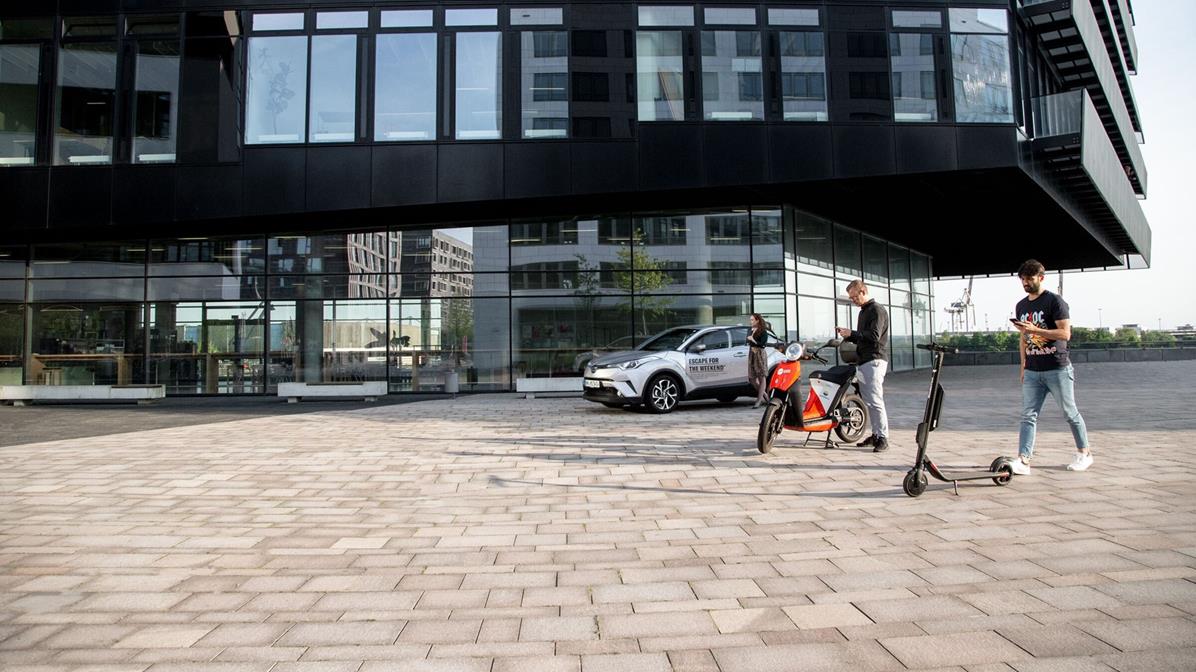WeAllMove: Mobility as a collaborative effort

For many years, the mobility industry has been calling for stronger cooperative approaches to joint mobility solutions in cities. The corona crisis has now accelerated this cooperation, as the platform #WeAllMove by the mobility tech start-up Wunder Mobility shows.
Nobody needed this crisis, stresses Ioana Freise, General Manager of Wunder Mobility. “But it has also set in motion and accelerated many things: collaborations suddenly moved faster, the public sector placed more trust in our industry – and all of us moved towards doing something rather than discussing things for a long time. We have seen how quickly some things can suddenly be implemented,” says Freise.
For many years, the mobility industry has been calling for stronger approaches for collaborative inner-city mobility solutions. The corona pandemic, of all things, has brought to light gaps and shortcomings in urban mobility and has boosted the demand for flexible ideas for mobility providers that can be implemented quickly. Individuals were dependent on mobility services during the lockdown, and companies in various industries were forced to switch to delivery services. And while many mobility providers were quick to develop their own crisis solutions, users lacked a central overview of what was on offer.
Central and transparent: #WeAllMove
As a direct reaction to this, the Hamburg-based mobility technology start-up Wunder Mobility, which specialises in mobility software for car and ridesharing and other mobility concepts, founded the initiative and platform #WeAllMove within a very short space of time. Its partners in this process were the COVID Action Platform of the World Economic Forum and the Global New Mobility Coalition as well as Hertz Germany, Allianz, Share Now and Voi.
“With #WeAllMove we combine the offers of mobility providers such as cities, sharing providers and fleet operators on one platform. Central and transparent,” explains Freise.
On www.weallmove.co, users can filter the categories country, city and benefit (for example ‘food delivery service’, ‘medical service’ or ‘long-haul’) according to their needs and get an overview of the available offers. The platform thus helps providers to make better use of their fleets, and it provides companies and individuals with suitable and straightforward vehicle offers.
The idea for the platform was born in mid-March 2020. “We were all uncertain about what was to come and immediately exchanged ideas with our customers and partners,” says Ioana Freise. “The idea was then to create transparency around the offer”. It took three weeks from the initial idea to get the platform online. In the meantime, more than 150 providers in over 350 cities from all over the world have joined the platform – and numbers are growing steadily.
Mobility is a collaborative effort
Competition among partners and providers has never been an issue with this. “We all wanted to make sure that the mobility market and all the things we have worked so hard for over the past few years would not collapse or experience setbacks in development. The big players helped the little ones, and our industry has in turn supported other industries,” explains Gunnar Froh, founder and CEO of Wunder Mobility.
After all, he says, mobility should be a collaborative effort. In times like these, companies should forget about competition and instead work together to find solutions and act responsibly. “And that isn’t just some glib phrase: it’s an invitation to join in!” stresses Froh.
The new mobility normality
Many things are now back to normal. However, the platform will be further developed and should function as a first step on the way to a new mobility normality. The crisis has already shown what this could look like: in Berlin, streets are being converted into cycle paths without fuss, Milan is excluding cars from the city centre even more, and Paris wants to convert 72 per cent of its parking spaces into green spaces and playgrounds. In many cities, sharing providers have expanded their catchment areas to the outskirts. That said, there is a but: corona has also brought the private car back into the city.
“We must actively counter the fact that people in the cities are once again turning to their private cars,” said Freise. “We now have the chance to make a difference for the future and to help shape the new mobility normality. Current mobility concepts are being questioned, a rethink has taken place and collaboration is suddenly moving at a faster pace. We must use this moment as a long-term opportunity to bring new concepts to the cities.”
Mobility & Logistics at Messe Frankfurt This article was first published in the Mobility & Logistics News of Messe Frankfurt, which is published every three months – free of charge and obligation. You can subscribe here.
Discover Messe Frankfurt’s international portfolio of events for the automotive, transport and logistics industries. Approx. 25,000 exhibitors and 830,000 visitors are already taking advantage of more than 40 trade fairs, conferences and other events offered by Messe Frankfurt. You will find dates, pictures and insights for these events here.





